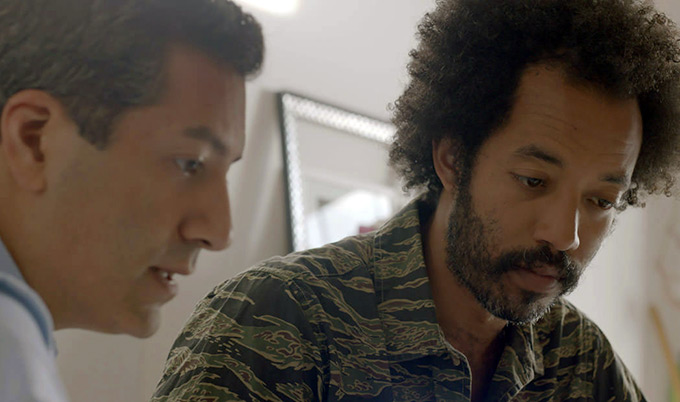Grief has a way of highlighting time and forcing us to face mortality. It directs us to examine our dreams, aspirations and life's journey. In Radha Blank's outstanding debut feature, The 40-Year-Old Version, the writer, director, producer and star grapples with defining success, fearlessness and the limits we put on ourselves.
Shot in crisp 35mm black and white, reminiscent of classic 1970s New York films, The 40-Year-Old Version introduces us to Radha, a fictionalized version of the filmmaker. A once-acclaimed playwright who made it onto a prestigious "30 under 30" list, Radha is now struggling to find her voice and her power in the wake of her mother's death. With her 40th birthday approaching, Radha spends her days teaching a crew of rambunctious high school students dramatic writing and taking long sips of a disgusting diet drink in a futile effort to lose weight.
Though she's written a promising new play, Harlem Ave, its only hope of being accepted into the very white New York City theater scene will be after extensive rewrites and thrusting a white woman at the center of the plot. These are changes that Radha isn't sure she can live with. Determined to shatter the struggling artist stereotype, Radha becomes reinvigorated by her long-forgotten passions; hip-hop and rapping. Embolden by the dazzling beats of a twenty-something Brownsville producer, D. Possible (a stoic and brilliant Oswin Benjamin), Radha begins channeling her pain and frustration through the rhymes and flows of her alter-ego, RadhaMUSprime.
Her raps like, "Poverty Porn" and "Black Woman Ass On a White Man," along with D's quiet encouragement, make Rhada feel alive. Yet she's increasingly aware of the absurdity of her new passion. Trying to keep what he believes is a mid-life-crisis at bay, Rhada's life-long best friend and agent, Archie (Peter Y. Kim), convinces her to rewrite Harlem Ave to regain her former glory as a darling of the New York theater scene. Under the direction of an absurd white producer, Josh (Reed Birney), whose latest claim to fame is a Harriet Tubman musical, Radha casts rapping aside for a white-washed Harlem Ave at a cost she never expected to pay.
Continue reading at Shadow and Act.






 Some of the most intriguing films are mysteries. You’re not sure what you’re looking at until the final frame, and sometimes, even then, you’re left questioning what you’ve just seen with your own two eyes. Bernardo Britto’s mockumentary “Jacqueline (Argentine)” left me with this particular feeling. So full of twist and turns, it’s a film that is as fascinating as it is exasperating. Britto was inspired by Laura Poitras’ Academy Award winning documentary “Citizenfour”, about NSA spy Eric Snowden. However, “Jacqueline (Argentine)” is something else entirely.
Some of the most intriguing films are mysteries. You’re not sure what you’re looking at until the final frame, and sometimes, even then, you’re left questioning what you’ve just seen with your own two eyes. Bernardo Britto’s mockumentary “Jacqueline (Argentine)” left me with this particular feeling. So full of twist and turns, it’s a film that is as fascinating as it is exasperating. Britto was inspired by Laura Poitras’ Academy Award winning documentary “Citizenfour”, about NSA spy Eric Snowden. However, “Jacqueline (Argentine)” is something else entirely.